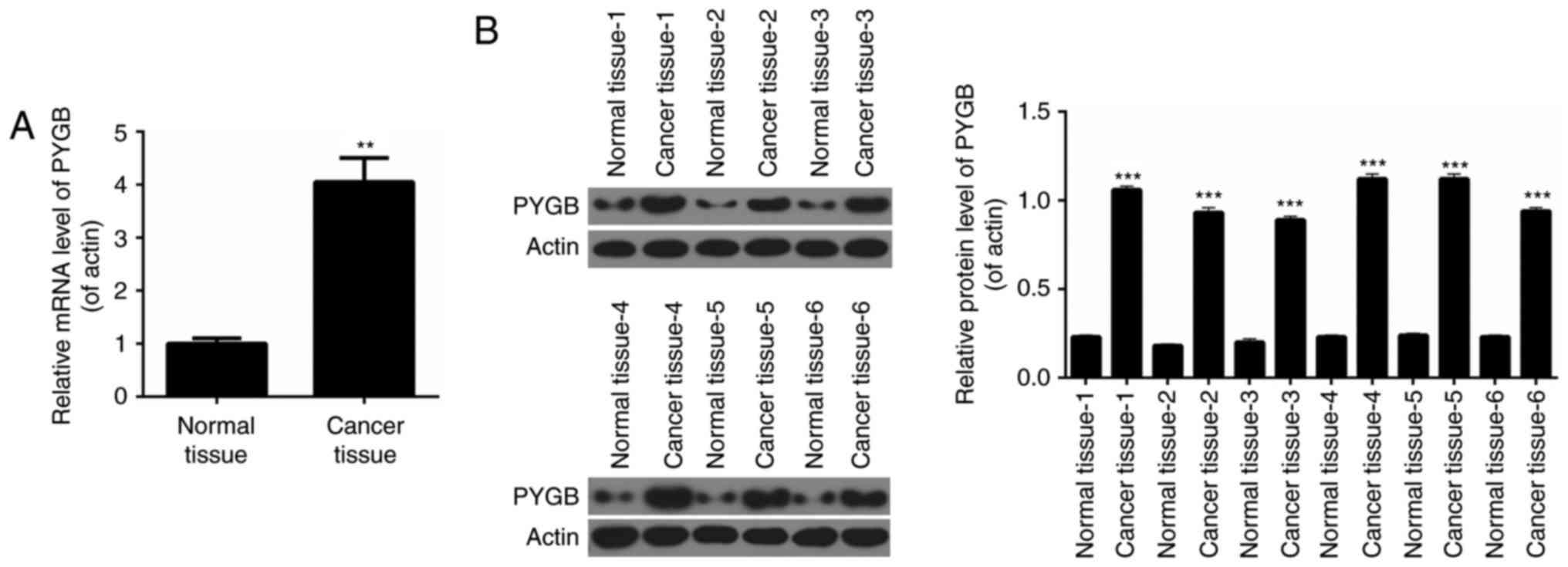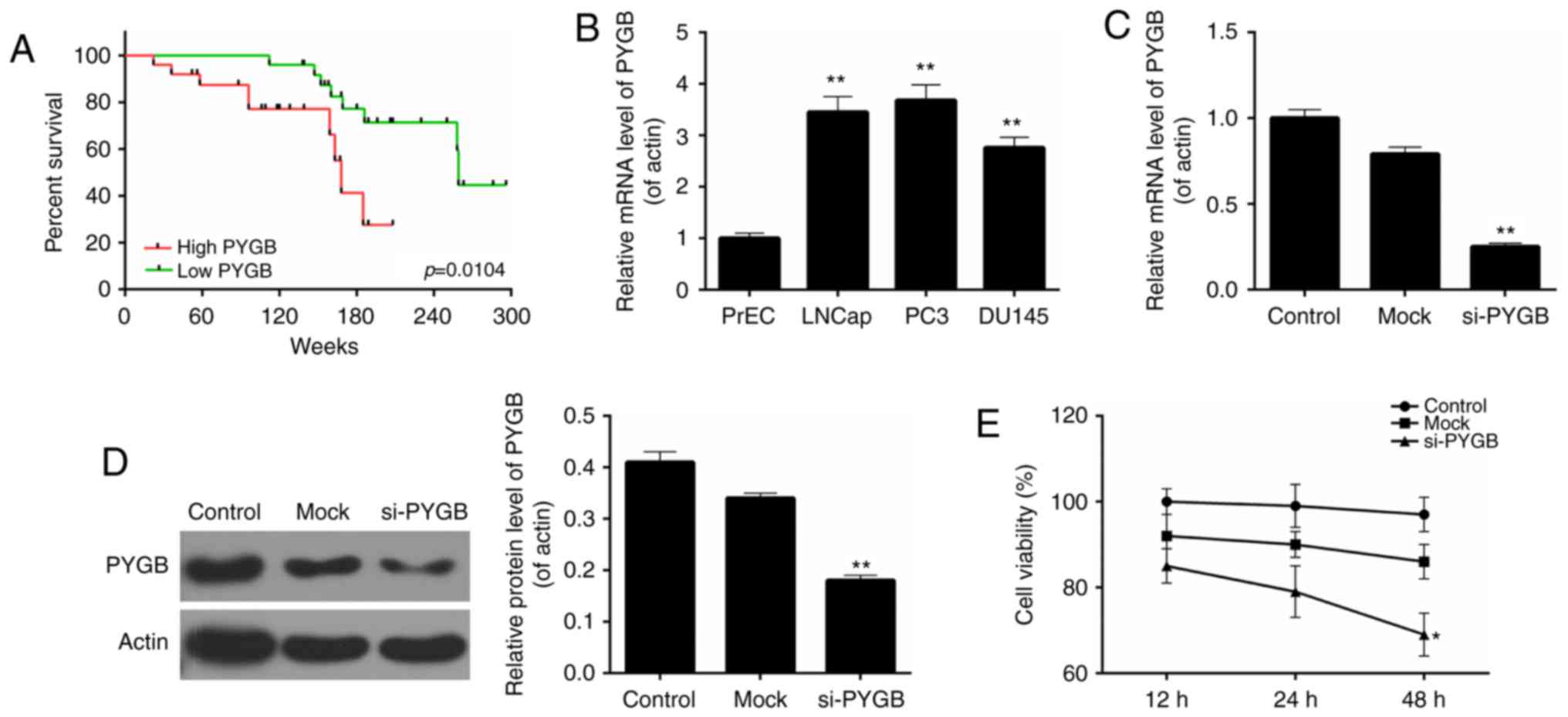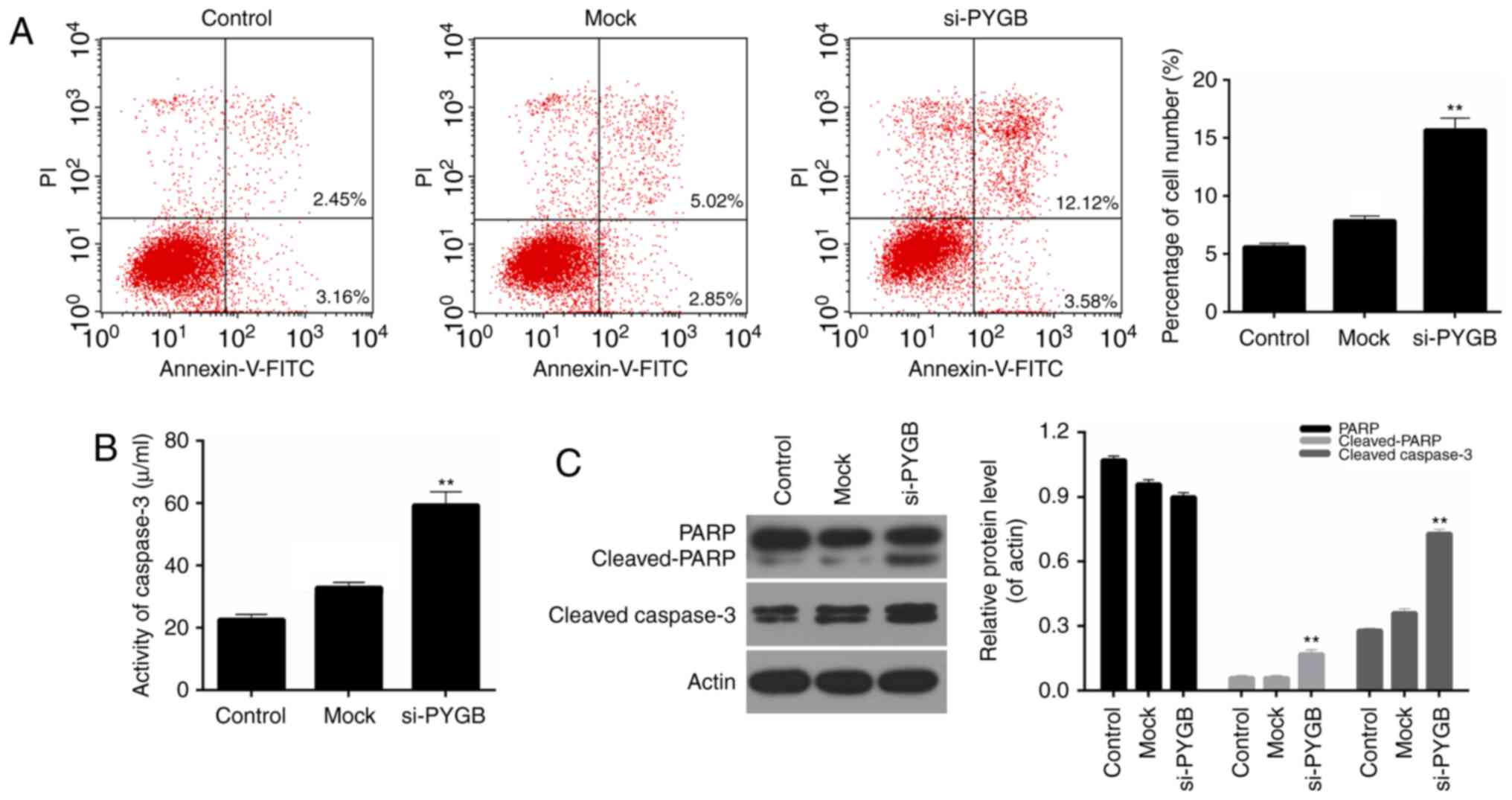|
1
|
Chen W, Zheng R, Zeng H, Zhang S and He J:
Annual report on status of cancer in China, 2011. Chin J Cancer
Res. 27:2–12. 2015. View Article : Google Scholar : PubMed/NCBI
|
|
2
|
Cai C, Chen S, Ng P, Bubley GJ, Nelson PS,
Mostaghel EA, Marck B, Matsumoto AM, Simon NI, Wang H, et al:
Intratumoral de novo steroid synthesis activates androgen receptor
in castration-resistant prostate cancer and is upregulated by
treatment with CYP17A1 inhibitors. Cancer Res. 71:6503–6513. 2011.
View Article : Google Scholar : PubMed/NCBI
|
|
3
|
Steeg PS: Metastasis suppressors alter the
signal transduction of cancer cells. Nat Rev Cancer. 3:55–63. 2003.
View Article : Google Scholar : PubMed/NCBI
|
|
4
|
Baldwin AS Jr: The NF-kappa B and I kappa
B proteins: New discoveries and insights. Annu Rev Immunol.
14:649–683. 1996. View Article : Google Scholar : PubMed/NCBI
|
|
5
|
Dutta J, Fan Y, Gupta N, Fan G and Gélinas
C: Current insights into the regulation of programmed cell death by
NF-kappaB. Oncogene. 25:6800–6816. 2006. View Article : Google Scholar : PubMed/NCBI
|
|
6
|
Clarkson RW and Watson CJ: NF-kappaB and
apoptosis in mammary epithelial cells. J Mammary Gland Biol
Neoplasia. 4:165–175. 1999. View Article : Google Scholar : PubMed/NCBI
|
|
7
|
Ma Q: Role of nrf2 in oxidative stress and
toxicity. Annu Rev Pharmacol Toxicol. 53:401–426. 2013. View Article : Google Scholar : PubMed/NCBI
|
|
8
|
Baird L and Dinkova-Kostova AT: The
cytoprotective role of the Keap1-Nrf2 pathway. Arch Toxicol.
85:241–272. 2011. View Article : Google Scholar : PubMed/NCBI
|
|
9
|
Li W and Kong AN: Molecular mechanisms of
Nrf2-mediated antioxidant response. Mol Carcinog. 48:91–104. 2009.
View Article : Google Scholar : PubMed/NCBI
|
|
10
|
Boyanapalli SS, Paredes-Gonzalez X,
Fuentes F, Zhang C, Guo Y, Pung D, Saw CL and Kong AN: Nrf2
knockout attenuates the anti-inflammatory effects of phenethyl
isothiocyanate and curcumin. Chem Res Toxicol. 27:2036–2043. 2014.
View Article : Google Scholar : PubMed/NCBI
|
|
11
|
Cheung KL, Lee JH, Khor TO, Wu TY, Li GX,
Chan J, Yang CS and Kong AN: Nrf2 knockout enhances intestinal
tumorigenesis in Apc(min/+) mice due to attenuation of
anti-oxidative stress pathway while potentiates inflammation. Mol
Carcinog. 53:77–84. 2014. View
Article : Google Scholar : PubMed/NCBI
|
|
12
|
Liu GH, Qu J and Shen X: NF-kappaB/p65
antagonizes Nrf2-ARE pathway by depriving CBP from Nrf2 and
facilitating recruitment of HDAC3 to MafK. Biochim Biophys Acta.
1783:713–727. 2008. View Article : Google Scholar : PubMed/NCBI
|
|
13
|
Ziady AG, Sokolow A, Shank S, Corey D,
Myers R, Plafker S and Kelley TJ: Interaction with CREB binding
protein modulates the activities of Nrf2 and NF-κB in cystic
fibrosis airway epithelial cells. Am J Physiol Lung Cell Mol
Physiol. 302:L1221–L1231. 2012. View Article : Google Scholar : PubMed/NCBI
|
|
14
|
Newgard CB, Hwang PK and Fletterick RJ:
The family of glycogen phosphorylases: Structure and function. Crit
Rev Biochem Mol Biol. 24:69–99. 1989. View Article : Google Scholar : PubMed/NCBI
|
|
15
|
Rich SS, Goodarzi MO, Palmer ND, Langefeld
CD, Ziegler J, Haffner SM, Bryer-Ash M, Norris JM, Taylor KD,
Haritunians T, et al: A genome-wide association scan for acute
insulin response to glucose in Hispanic-Americans: The insulin
resistance atherosclerosis family study (IRAS FS). Diabetologia.
52:1326–1333. 2009. View Article : Google Scholar : PubMed/NCBI
|
|
16
|
Shimada S, Maeno M, Akagi M, Hatayama I,
Sato T and Sato K: Immunohistochemical detection of glycogen
phosphorylase isoenzymes in rat and human tissues. Histochem J.
18:334–338. 1986. View Article : Google Scholar : PubMed/NCBI
|
|
17
|
Barbosa AJ and Castro LP: BGP expression
in gastric epithelium and early gastric cancer. Gastric Cancer.
5:123–124. 2002. View Article : Google Scholar : PubMed/NCBI
|
|
18
|
Lee MK, Kim JH, Lee CH, Kim JM, Kang CD,
Kim YD, Choi KU, Kim HW, Kim JY, Park DY, et al:
Clinicopathological significance of BGP expression in
non-small-cell lung carcinoma: Relationship with histological type,
microvessel density and patients' survival. Pathology. 38:555–560.
2006. View Article : Google Scholar : PubMed/NCBI
|
|
19
|
Shiomori K, Shimada S, Marutsuka T,
Hatayama I and Ogawa M: Genetic pathways of ‘de novo’ colorectal
carcinomas with reference to fetal-type glycogen phosphorylase
positive foci. Int J Oncol. 22:65–74. 2003.PubMed/NCBI
|
|
20
|
Tashima S, Shimada S, Yamaguchi K, Tsuruta
J and Ogawa M: Expression of brain-type glycogen phosphorylase is a
potentially novel early biomarker in the carcinogenesis of human
colorectal carcinomas. Am J Gastroenterol. 95:255–263. 2000.
View Article : Google Scholar : PubMed/NCBI
|
|
21
|
Kim SY, Nishioka M, Hayashi S, Honda H,
Kobayashi T and Taya M: The gene yggE functions in restoring
physiological defects of Escherichia coli cultivated under
oxidative stress conditions. Appl Environ Microbiol. 71:2762–2765.
2005. View Article : Google Scholar : PubMed/NCBI
|
|
22
|
Livak KJ and Schmittgen TD: Analysis of
relative gene expression data using real-time quantitative PCR and
the 2(-Delta Delta C(T)) method. Methods. 25:402–408. 2001.
View Article : Google Scholar : PubMed/NCBI
|
|
23
|
Uno K, Shimada S, Tsuruta J, Matsuzaki H,
Tashima S and Ogawa M: Nuclear localization of brain-type glycogen
phosphorylase in some gastrointestinal carcinoma. Histochem J.
30:553–559. 1998. View Article : Google Scholar : PubMed/NCBI
|
|
24
|
Lee CH, Son HI, Kim JH, Choi KU, Kim JY,
Park DY and Sol MY: Clinicopathologic significance of brain-type
glycogen phosphorylase expression in non-small-cell lung
carcinomas. Lung Cancer. S41–S42. 2004.PubMed/NCBI
|
|
25
|
Takashi M, Koshikawa T, Kurobe N and Kato
K: Elevated concentrations of brain-type glycogen phosphorylase in
renal cell carcinoma. Jpn J Cancer Res. 80:975–980. 1989.
View Article : Google Scholar : PubMed/NCBI
|
|
26
|
Sato K, Morris HP and Weinhouse S:
Phosphorylase: A new isozyme in rat hepatic tumors and fetal liver.
Science. 178:879–881. 1972. View Article : Google Scholar : PubMed/NCBI
|
|
27
|
Royle JS, Ross JA, Ansell I, Bollina P,
Tulloch DN and Habib FK: Nitric oxide donating nonsteroidal
anti-inflammatory drugs induce apoptosis in human prostate cancer
cell systems and human prostatic stroma via caspase-3. J Urol.
172:338–344. 2004. View Article : Google Scholar : PubMed/NCBI
|
|
28
|
Tang DG, Li L, Zhu Z and Joshi B:
Apoptosis in the absence of cytochrome c accumulation in the
cytosol. Biochem Biophys Res Commun. 242:380–384. 1998. View Article : Google Scholar : PubMed/NCBI
|
|
29
|
Hafeez BB, Siddiqui IA, Asim M, Malik A,
Afaq F, Adhami VM, Saleem M, Din M and Mukhtar H: A dietary
anthocyanidin delphinidin induces apoptosis of human prostate
cancer PC3 cells in vitro and in vivo: Involvement of nuclear
factor-kappaB signaling. Cancer Res. 68:8564–8572. 2008. View Article : Google Scholar : PubMed/NCBI
|
|
30
|
Lü L, Tang D, Wang L, Huang LQ, Jiang GS,
Xiao XY and Zeng FQ: Gambogic acid inhibits TNF-α-induced invasion
of human prostate cancer PC3 cells in vitro through PI3K/Akt and
NF-κB signaling pathways. Acta Pharmacol Sin. 33:531–541. 2012.
View Article : Google Scholar : PubMed/NCBI
|
|
31
|
Raj GV, Sekula JA, Guo R, Madden JF and
Daaka Y: Lysophosphatidic acid promotes survival of
androgen-insensitive prostate cancer PC3 cells via activation of
NF-kappaB. Prostate. 61:105–113. 2004. View Article : Google Scholar : PubMed/NCBI
|
|
32
|
Shaikh IA, Brown I, Schofield AC, Wahle KW
and Heys SD: Docosahexaenoic acid enhances the efficacy of
docetaxel in prostate cancer cells by modulation of apoptosis: The
role of genes associated with the NF-kappaB pathway. Prostate.
68:1635–1646. 2008. View Article : Google Scholar : PubMed/NCBI
|
|
33
|
Jayakumar S, Kunwar A, Sandur SK, Pandey
BN and Chaubey RC: Differential response of DU145 and PC3 prostate
cancer cells to ionizing radiation: Role of reactive oxygen
species, GSH and Nrf2 in radiosensitivity. Biochim Biophys Acta.
1840:485–494. 2014. View Article : Google Scholar : PubMed/NCBI
|
|
34
|
Nair S, Barve A, Khor TO, Shen GX, Lin W,
Chan JY, Cai L and Kong AN: Regulation of Nrf2- and AP-1-mediated
gene expression by epigallocatechin-3-gallate and sulforaphane in
prostate of Nrf2-knockout or C57BL/6J mice and PC-3 AP-1 human
prostate cancer cells. Acta Pharmacol Sin. 31:1223–1240. 2010.
View Article : Google Scholar : PubMed/NCBI
|
|
35
|
Zhang C, Su ZY, Khor TO, Shu L and Kong
AN: Sulforaphane enhances Nrf2 expression in prostate cancer TRAMP
C1 cells through epigenetic regulation. Biochem Pharmacol.
85:1398–1404. 2013. View Article : Google Scholar : PubMed/NCBI
|
|
36
|
Surh YJ: NF-kappa B and Nrf2 as potential
chemopreventive targets of some anti-inflammatory and antioxidative
phytonutrients with anti-inflammatory and vantioxidative
activities. Asia Pac J Clin Nutr. 17 Suppl 1:S269–S272. 2008.
|
|
37
|
Mandal A, Bhatia D and Bishayee A:
Anti-Inflammatory Mechanism Involved in Pomegranate-Mediated
Prevention of Breast Cancer: The Role of NF-κB and Nrf2 Signaling
Pathways. Nutrients. 9(pii): E4362017. View Article : Google Scholar : PubMed/NCBI
|
|
38
|
Yao J, Zhao L, Zhao Q, Zhao Y, Sun Y,
Zhang Y, Miao H, You QD, Hu R and Guo QL: NF-κB and Nrf2 signaling
pathways contribute to wogonin-mediated inhibition of
inflammation-associated colorectal carcinogenesis. Cell Death Dis.
5:e12832014. View Article : Google Scholar : PubMed/NCBI
|




















